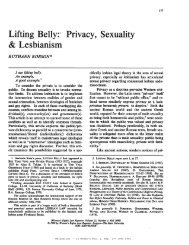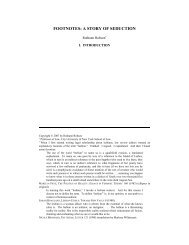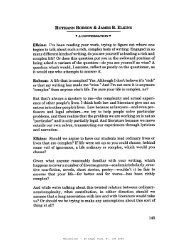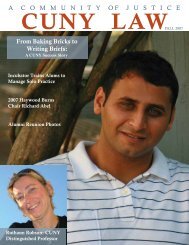Striving to Be Selfish - Ruthann Robson
Striving to Be Selfish - Ruthann Robson
Striving to Be Selfish - Ruthann Robson
Create successful ePaper yourself
Turn your PDF publications into a flip-book with our unique Google optimized e-Paper software.
<strong>Striving</strong> <strong>to</strong> <strong>Be</strong> <strong>Selfish</strong><br />
<strong>Ruthann</strong> <strong>Robson</strong><br />
SUMMARY. In ‘‘<strong>Striving</strong> <strong>to</strong> <strong>Be</strong> <strong>Selfish</strong>,’’ <strong>Ruthann</strong> <strong>Robson</strong> explores<br />
the different kinds of selfishness it takes <strong>to</strong> be a writer and a dyke, especially<br />
the necessary focus on the higher self. Distinguishing the writer<br />
from the author (and the dyke from the lesbian), she argues that there is<br />
an almost spiritual dimension <strong>to</strong> the practices of writing and sex. [Article<br />
copies available for a fee from The Haworth Document Delivery Service:<br />
1-800-342-9678. E-mail address: Website:<br />
]<br />
KEYWORDS. Self-writing, selfish, sex, dyke, writer<br />
<strong>Be</strong>ing a writer, like being a dyke, is essentially selfish.<br />
It takes a tremendous amount of selfishness <strong>to</strong> become a writer or a<br />
dyke. In both instances, one must put oneself first and foremost. A<br />
<strong>Ruthann</strong> <strong>Robson</strong>’s latest book is a collection of short fiction entitled The Struggle<br />
for Happiness, published by St. Martin’s Press in 2000. Her previous books include<br />
two collections of short fiction, Eye of a Hurricane (1989) and Cecile (1991), both<br />
published by the lesbian/feminist Firebrand Books, and two novels, Another Mother<br />
(1995) and a/k/a (1997), both published by St. Martin’s Press. Her volume of poetry,<br />
Masks, with an introduction by Marge Piercy, was published by Leapfrog Press in<br />
1999, and a new volume of lesbian legal theory, Sappho Goes <strong>to</strong> Law School, was<br />
published by Columbia University Press in 1998. She is Professor of Law at the City<br />
University of New York School of Law, one of the very few progressive law schools<br />
in the world.<br />
Address correspondence <strong>to</strong>: <strong>Ruthann</strong> <strong>Robson</strong>, CUNY School of Law, 65-21 Main<br />
Street, Flushing, NY 11367 USA.<br />
[Haworth co-indexing entry note]: ‘‘<strong>Striving</strong> <strong>to</strong> <strong>Be</strong> <strong>Selfish</strong>.’’ <strong>Robson</strong>, <strong>Ruthann</strong>. Co-published simultaneously<br />
in Journal of Lesbian Studies (Harring<strong>to</strong>n Park Press, an imprint of The Haworth Press, Inc.) Vol. 4, No. 4, 2000,<br />
pp. 125-130; and: Lesbian Self-Writing: The Embodiment of Experience (ed: Lynda Hall) Harring<strong>to</strong>n Park Press,<br />
an imprint of The Haworth Press, Inc., 2000, pp. 125-130. Single or multiple copies of this article are available<br />
for a fee from The Haworth Document Delivery Service [1-800-342-9678, 9:00 a.m. - 5:00 p.m. (EST). E-mail<br />
address: getinfo@haworthpressinc.com].<br />
2000 by The Haworth Press, Inc. All rights reserved. 125
126<br />
LESBIAN SELF-WRITING: THE EMBODIMENT OF EXPERIENCE<br />
<strong>Ruthann</strong> <strong>Robson</strong><br />
Pho<strong>to</strong> by S. E. Valentine. Used by permission.<br />
writer must write, which is a solitary activity requiring the forestalling<br />
of those who would claim one’s time and attention. A dyke must<br />
disappoint others who had expectations that she would be heterosexual.<br />
<strong>Selfish</strong>ness has a bad reputation, of course. It’s an accusation we<br />
level at others when we feel as if we’re not getting our due. It’s<br />
something we may worry over if we suspect it in ourselves. But, the<br />
selfishness I think of as negative is displayed by a narrow anxious self,<br />
what Freudians would call the ego. A writer’s selfishness in those<br />
instances might be displayed when she worries over the placement of<br />
her work in an anthology or the misspelling of her name. A dyke’s<br />
selfishness could be apparent when she finds herself resenting her<br />
lover’s s<strong>to</strong>ries of a former lover. The self’s anxiety–its ‘‘ishness’’–concerns<br />
its felt necessity of proving its own importance.<br />
But I want <strong>to</strong> argue for the significance of another kind of selfish-
<strong>Ruthann</strong> <strong>Robson</strong> 127<br />
ness, call it capital ‘‘S’’ <strong>Selfish</strong>ness. For the Self involved in this<br />
instance is the capital ‘‘S’’ Self. Forgetting the Freudians and their<br />
super-ego, I would prefer <strong>to</strong> think of this Self as being the drive <strong>to</strong><br />
connect with something higher and more grandiose than daily life.<br />
Some call it Soul, or Spirit, or Goddess, or even God. And some do not<br />
name it at all. But practicing this kind of <strong>Selfish</strong>ness paradoxically<br />
takes one out of that crabbed and insecure self which is prone <strong>to</strong> the<br />
kind of grasping selfishness we rightly abhor.<br />
Too mystical for many, I suppose. Certainly not trendy in these<br />
postmodern times, when it is fashionable <strong>to</strong> reject any claims <strong>to</strong> truth<br />
or authenticity. Yet as a writer and a dyke, I feel I connect with<br />
something higher and more powerful when I engage in those selfish<br />
practices that make me a writer and a dyke. Meditation or ballet or<br />
pottery or tantric heterosexuality may work for others, but for me it’s<br />
writing and sex. I like <strong>to</strong> think of these practices in broad senses;<br />
writing is not just pen <strong>to</strong> paper (or fingers <strong>to</strong> keyboard), just as sex is<br />
not just a finger on a cli<strong>to</strong>ris. It’s the idea scribbled and then crossed<br />
out; it’s the flirtation; it’s the car pulled over and pen pulled out <strong>to</strong><br />
write a phrase; it’s the kiss at the door goodbye and the smile hello. I<br />
might even call it a discipline. Working on a stanza because one word<br />
sounds wrong; looking at one’s own body with love despite its scars.<br />
These practices forge a connection between the daily self and the<br />
expansive Self.<br />
Not that I always connect. The struggle is <strong>to</strong> make that connection<br />
and <strong>to</strong> sustain it. This is not always easy, especially since the writer<br />
and the dyke are always in danger of being colonized–or in the term<br />
that I prefer, domesticated–by two other identities, that of the author<br />
and the lesbian.<br />
Resisting the Author’s domestication of the Writer is often difficult.<br />
It requires one <strong>to</strong> be <strong>Selfish</strong>. I strive <strong>to</strong> be <strong>Selfish</strong> by not allowing the<br />
Author much influence. It is the Author who looks at sales figures,<br />
who reads reviews, who gives readings and signs books and carefully<br />
considers the electronics rights clause in publishing contracts. These<br />
things may be necessary, but the Writer’s Self must be protected<br />
against them lest they masquerade as the reasons the Writer writes. For<br />
I don’t think the Writer writes <strong>to</strong> be an Author, she writes <strong>to</strong> explore<br />
some core of life that is otherwise inaccessible. Once the Writer concerns<br />
herself with sales figures or reviews of her last published effort,<br />
then the Writer’s practice of her new work is affected. She might think
128<br />
LESBIAN SELF-WRITING: THE EMBODIMENT OF EXPERIENCE<br />
of a reviewer’s critique that a book did not have a happy ending, for<br />
example, and decide <strong>to</strong> have her new novel have a happy ending.<br />
When the impetus for writing comes from a desire <strong>to</strong> please others, the<br />
Writer is paradoxically locked inside her most parochial self.<br />
<strong>Be</strong>ing <strong>Selfish</strong> as a Writer means writing for one’s highest most<br />
expansive Self and exiling the Author. I have been heavily counseled<br />
<strong>to</strong> write about subjects and in genres other than the ones I am choosing.<br />
Replace poetry with a lesbian mystery, I’ve been <strong>to</strong>ld, by persons<br />
who believed they had my best interests at heart. Make my characters<br />
more likable, it’s been suggested. Write shorter, write longer, take out<br />
the sex, pen erotica. The advice is often contradic<strong>to</strong>ry, but it consistently<br />
ignores the Self in favor of the market driven concerns that<br />
would interest the Author.<br />
I try <strong>to</strong> write for my highest Self, but I often start my writing<br />
process with the ideas that interest my embodied lower case ‘‘s’’ self. I<br />
write things I want <strong>to</strong> know, but don’t yet know when I start the<br />
writing. I write <strong>to</strong> solve a problem or explore an issue, even if that<br />
‘‘issue’’ is one that I construct as a character, a plot, or a setting. For<br />
example, in the series of linked s<strong>to</strong>ries that is Cecile, I was occupied<br />
by the daily lives of two lesbians who were in love and stayed that way<br />
throughout the book. Until that time, I had not read a book involving a<br />
lesbian relationship that did not involve either a getting <strong>to</strong>gether love<br />
s<strong>to</strong>ry or a breaking up/death tragedy. In the novel Another Mother, the<br />
situation I set for myself was a lesbian who was admired and cool and<br />
a professional role model on the outside and <strong>to</strong>tally messed up on the<br />
inside. And in the novel a/k/a, I worried over whether there were such<br />
things as an essential core of identity and love at first sight.<br />
Although fueled by lowercase ‘‘s’’ self-concerns, the actual practice<br />
of writing can lead <strong>to</strong> the concerns of this higher Self. For example, in<br />
a/k/a, my interest in the phenomenon of love at first sight led me <strong>to</strong><br />
places that I could never have anticipated. In a novella entitled Close<br />
<strong>to</strong> U<strong>to</strong>pia, which will be part of my forthcoming collection of fiction,<br />
The Struggle for Happiness, I started with the issue of animal rights<br />
and found myself contemplating communication between animals and<br />
humans. Often, however, there is nothing in the content of the writing<br />
that reveals connection with the higher Self. For it is not really a<br />
matter of subject as much as it is a matter of the process, the practice,<br />
the craft. It’s the juxtaposition of images, alliteration imagined or<br />
abandoned, a structural problem solved. It’s listening <strong>to</strong> the chant-like
<strong>Ruthann</strong> <strong>Robson</strong> 129<br />
sound of a line that no one else may hear or building the abstract<br />
scaffolding of a novel that will be invisible <strong>to</strong> most. It’s sniffing out a<br />
word until it leaps out from behind the most unlikely bush, startling<br />
and almost scary.<br />
Creative writing is most likely <strong>to</strong> manifest the epiphanies that mark<br />
connections with the higher Self, but I also try <strong>to</strong> practice <strong>Selfish</strong><br />
Scholarship. Again, I strive <strong>to</strong> write about things that I want <strong>to</strong> know.<br />
What are the connections between the ways lesbians are treated in law<br />
and literature? How are lesbians treated when they are criminal defendants?<br />
How do critiques of narrative implicate lesbian narratives?<br />
What would happen if Sappho went <strong>to</strong> law school? Is it true that<br />
lesbians were never prosecuted for their sexual acts? In exploring<br />
these questions, I accessed what I thought were acceptable answers<br />
through the process of writing, supported by research and theorizing.<br />
As in fiction and poetry, however, I did not know what I wanted <strong>to</strong> say<br />
before I started the struggle <strong>to</strong> articulate it. Thus, I do not write <strong>to</strong><br />
persuade or inform. I write because I want <strong>to</strong> know, even if what I<br />
want <strong>to</strong> know is only what I think about something.<br />
I cannot always be <strong>Selfish</strong>, however, or even selfish. Like many<br />
others, writing is a part of the ways in which I earn a living. In my<br />
many years of working, as an at<strong>to</strong>rney and a professor, I have written<br />
countless letters, more memos than I would like, a file cabinet full of<br />
exam hypotheticals and multiple choice questions, and probably<br />
hundreds of persuasive legal documents of all sorts. This type of<br />
writing is ‘‘work.’’ Further, when asked, I do agree <strong>to</strong> do things that do<br />
not contribute <strong>to</strong> earning a living that I would classify as ‘‘service’’<br />
rather than work or writing, such as encyclopedia entries, book reviews,<br />
and manuscript assessments. The Author rather than the Writer<br />
is asked <strong>to</strong> do these things and the Author rather than the Writer<br />
performs them. Nevertheless, I try <strong>to</strong> limit these activities and never<br />
allow the Author <strong>to</strong> write creatively. So when I am asked <strong>to</strong> submit a<br />
piece of erotica or a memoir or some science fiction, my possibility of<br />
submission is limited by pieces I have already written, even if only in<br />
draft.<br />
My best writing–which may not be my most popular work or my<br />
most critically acclaimed work–occurs when my Self is caught making<br />
love with something higher than its self. Which brings me <strong>to</strong> the<br />
<strong>Selfish</strong>ness of being a dyke.<br />
Like the Writer in danger of being domesticated by the Author, the
130<br />
LESBIAN SELF-WRITING: THE EMBODIMENT OF EXPERIENCE<br />
Dyke lives in danger of being domesticated by the Lesbian. The Lesbian<br />
is the softer, more socially acceptable version, who struggles for<br />
the status of sexual subject in the context of political rights and who<br />
argues that her relationships are commensurate with heterosexual<br />
ones. The Lesbian is necessary, as is the Author, for she is the public<br />
figure whose goal is often <strong>to</strong> protect the private reality. Yet again, the<br />
inner Dyke needs <strong>to</strong> be protected from the outer Lesbian. The Lesbian<br />
would convince the Dyke that her reality is ‘‘equal’’ <strong>to</strong> heterosexuality.<br />
She would say that its ludicrous <strong>to</strong> believe that the practices of<br />
dykedom–whatever one believes them <strong>to</strong> be–come from some higher<br />
Self or connect with some higher Spirit.<br />
I am not advocating that Writers or Dykes abandon the sensory or<br />
intellectual worlds in favor of some shapeless spirituality. In fact, I<br />
believe Writers and Dykes must live fully in these realms. The smell<br />
of ink and my lover’s sweat. The logical structure of a paragraph and a<br />
discussion in bed with my lover. But these are not the only realms that<br />
are accessible <strong>to</strong> me as a Dyke and as a Writer. Not the only realms<br />
that surface in conversations with other Dykes and other Writers. Not<br />
the realms which cause me <strong>to</strong> be <strong>Selfish</strong>.<br />
To be a Dyke Writer is <strong>to</strong> be <strong>Selfish</strong>. <strong>Be</strong>ing a Dyke is attempting <strong>to</strong><br />
communicate with this capital ‘‘S’’ Self through the body. <strong>Be</strong>ing a<br />
Writer is attempting <strong>to</strong> communicate with this capital ‘‘S’’ Self<br />
through language. Yet both the body and language are ultimately<br />
inadequate. It’s the fate–and the joy–of the Dyke Writer that we keep<br />
trying, in our <strong>Selfish</strong> determination and ambition, <strong>to</strong> get it right.






